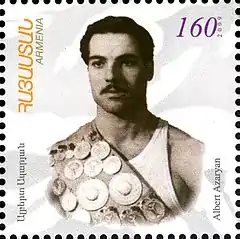Gymnastics at the 1956 Summer Olympics – Men's rings
The men's rings competition was one of eight events for male competitors in artistic gymnastics at the 1956 Summer Olympics in Melbourne. It was held from 3 to 7 December at the Melbourne Festival Hall. There were 63 competitors from 18 nations (down sharply from the 185 gymnasts in 1952), with nations in the team competition having up to 6 gymnasts and other nations entering up to 3 gymnasts.[1] The event was won by Albert Azaryan of the Soviet Union, the nation's second consecutive victory in the rings. Another Soviet, Valentin Muratov, took silver (the second consecutive silver in the event for the Soviets, as well). Masumi Kubota and Masao Takemoto earned Japan's first medals in the event, tying for bronze.
| Men's rings at the Games of the XVI Olympiad | |||||||||||||
|---|---|---|---|---|---|---|---|---|---|---|---|---|---|
 Albert Azaryan depicted on Armenian stamp | |||||||||||||
| Venue | Festival Hall | ||||||||||||
| Dates | 3–7 December | ||||||||||||
| Competitors | 63 from 18 nations | ||||||||||||
| Winning score | 19.35 | ||||||||||||
| Medalists | |||||||||||||
| |||||||||||||
| Gymnastics at the 1956 Summer Olympics | ||
|---|---|---|
| Artistic | ||
| Team all-around | men | women |
| Team Portable Apparatus | women | |
| Individual all-around | men | women |
| Vault | men | women |
| Floor | men | women |
| Pommel horse | men | |
| Rings | men | |
| Parallel bars | men | |
| Horizontal bar | men | |
| Uneven bars | women | |
| Balance beam | women | |
Background
This was the ninth appearance of the event, which is one of the five apparatus events held every time there were apparatus events at the Summer Olympics (no apparatus events were held in 1900, 1908, 1912, or 1920). Four of the top 10 gymnasts from 1952 returned: silver medalist Viktor Chukarin and fifth-place finisher Valentin Muratov of the Soviet Union, sixth-place finisher Masao Takemoto of Japan, and seventh-place finisher Berndt Lindfors of Finland. At the 1954 world championships, the Soviet Union had swept the top 6 places, with Albert Azaryan the victor.[1]
Australia and Canada each made their debut in the men's rings; East and West Germany competed together as the United Team of Germany for the first time. The United States made its eighth appearance, most of any nation, having missed only the inaugural 1896 Games.
Competition format
The gymnastics format continued to use the aggregation format, mostly following the scoring tweaks made in 1952. Each nation entered either a team of six gymnasts or up to three individual gymnasts. All entrants in the gymnastics competitions performed both a compulsory exercise and a voluntary exercise for each apparatus. The 2 exercise scores were summed to give an apparatus total. No separate finals were contested.
Exercise scores ranged from 0 to 10 and apparatus scores from 0 to 20.[2]
Schedule
All times are Australian Eastern Standard Time (UTC+10)
| Date | Time | Round |
|---|---|---|
| Monday, 3 December 1956 Tuesday, 4 December 1956 Wednesday, 5 December 1956 Thursday, 6 December 1956 Friday, 7 December 1956 | 8:00 | Final |
Results
References
- "Rings, Men". Olympedia. Retrieved 4 December 2020.
- Official Report, p. 472.